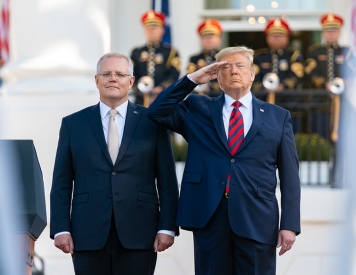The ADF claims it does not track civilians killed in airstrikes in Iraq and Syria, thereby washing it hands of alleged atrocities, writes Kellie Tranter.
On 14 March 2017, ABC 7.30 aired an important story by Middle East correspondent Sophie McNeill, which suggested that the Australian Defence Force is thumbing its nose at international law and legal conventions in relation to its obligations to track and investigate the civilians killed in its airstrikes in Iraq and Syria.
McNeill’s investigation quoted from a response to my January 2017 Freedom of Information request to the Department of Defence which stated that:
‘The Department does not specifically collect authoritative (and therefore accurate) data on enemy and/or civilian casualties in either Iraq or Syria and certainly does not track such statistics….’
In an evasive answer to McNeill on 20 February 2017, the Department of Defence confirmed:
United States Central Command provides daily information about the details of coalition air strikes conducted in Iraq and Syria. Australian air strikes are included in these summaries. In addition, the Australian Defence Force (ADF) provides regular public updates on its operations, including in Iraq and Syria, and aims to balance the protection of operational security with its obligation to be transparent and accountable to the Australian public.The Chief of Joint Operations also conducts regular media briefings. Most recently the ADF provided outcomes into the investigation into Coalition-led airstrikes near Dayr az Zawr in Syria. Statistical data about air operations is available on the Defence website, however, the ADF does not provide mission-specific details on individual engagements for operational security reasons.The Australian Defence Force operates in Iraq and Syria under strict Rules of Engagement (RoE) designed to protect our forces, minimise the risk of injury to civilian non-combatants and strictly comply with Australia’s obligations under domestic and international law. The Australian Air Task Group undertakes a detailed and robust sovereign approval process prior to conducting any strikes, which ensures that Australia’s legal obligations are applied. All ADF personnel are required to immediately report suspected instances of civilian casualties. All reports are investigated, as was the case with the Dayr az Zawr airstrikes.
One wonders why, if ADF personnel are required to immediately report suspected instances of civilian casualties with all reports being investigated, such reports didn’t fall within the scope of my Freedom of Information request.
During McNeill’s investigation 'Airwars' – an independent body monitoring and assessing reports of civilian casualties – confirmed through its U.S. military source that the United States cannot compel Australia or any other country to disclose civilian casualties even if the United States thinks that country has potentially caused civilian casualties.
McNeill’s report was both well investigated and self-explanatory, but there’s a story in its aftermath.
McNeill’s investigation deserved closer examination and public comment by the political class, particularly in light of recent revelations of the deaths of hundreds of civilians in the Mosul Jadida neighbourhood as a result of coalition airstrikes. Yet no one within the political class was galloping around the political arena making public comments, raising important questions or fighting to preserve fundamental values. An eerie, unethical, unreasonable silence descended (although I do asknowledge recent probing by the Greens in relation to the aleged Mosul Jadida atrocities).
Once the story had aired, the historical record had changed. From that point onwards no politician in Canberra could claim that they didn’t know that our Defence Force ‘didn’t specifically collect authoritative (and therefore accurate) data on enemy and/or civilian casualties in either Iraq or Syria and certainly does not track such statistics.’ Putting morality to one side, what better propaganda exists, for those with ill-intentions, than to misuse this as evidence that a life of an Iraqi or Syrian counts for nothing by its so called liberators.
Apart from some outraged users of Twitter and Facebook, the story sank. Having been involved in issuing the Freedom of Information request referred to in McNeill’s investigation and having witnessed the subsequent silence, I was left thinking that no one cares unless they suffer things themselves, that our politicians have no concept of what war means for people on the ground – the hunger, the displacement, the loss of loved ones, the collective suffering – and that war is not only indiscriminate it corrupts everyone.
I personally tried to draw the importance of the investigation to the attention of Prime Minister Malcolm Turnbull, Foreign Affairs Minister Julie Bishop, Defence Minister Marise Payne, the Greens, Andrew Wilkie and Opposition defence spokesperson Richard Marles.
Mosul residents were told not to flee before airstrikes that killed civilians https://t.co/NYGha1NuuV
— Dave Donovan (@davrosz) March 31, 2017
It was the response from the chief of staff of Richard Marles that best captured the frank silence:
‘Mr Marles has no plans to comment publicly at this time.’
A friend based in Canberra contacted me recently offering words of encouragement. He assured me that, although the response to my Freedom of Information request came from a low ranking officer, it would have been screened and approved at the highest levels — including the vice-admiral-within the Department of Defence and, in all likelihood, crossed the minister’s desk. He agreed with my assessment that the Australian Department of Defence would have known that, as shocking as its response would be to the humanitarian eye, that it would go nowhere, that politicians would fall into line, and that journalists-who have established relationships with the ADF would not ask questions at the risk of losing "insider" status and/or access.
So what are we left with?
The burial of truth. A closed bloc hunkered down in Canberra who conceal information and who fail to condemn the loss of life of innocents at the hands of either our country or our allies, and who are cut off from the consequences of their own cruelty, stupidity and collaboration. Defence personnel who no longer fight for a better future for Australians.
The Australian Minister for Foreign Affairs Julie Bishop confirmed in a statement to the Global Coalition on 22 March 2017 that Australia has undertaken over 2,000 "sorties" (bombing runs) in Syria and Iraq. Yet the only publicly reported casualties announced by the Turnbull Government relate to the death of Syrian soldiers in September 2016.
Julie Bishop did not remain silent about the humanitarian crisis in Aleppo. Malcolm Turnbull was swift to condemn the recent deadly terrorist attack outside London's Houses of Parliament. Yet both remain silent about the atrocities unfolding in Mosul, an area where most of Australia's military actions are concentrated. The concealment continues — and for no good reason.
What must we do to get our government to account for their actions and consequences, at least to the extent of the voluntary disclosure of information such as is provided by virtually all other participants? Why do we not stand up to a government that runs roughshod over both its constituents and their democratic ideals?
Kellie Tranter is a lawyer and human rights activist. You can follow Kellie on Twitter @KellieTranter.
Honoured to be a part of this story by the courageous @Sophiemcneill Thank you @airwars https://t.co/bKuoQlnFkj #warcorruptseveryone #auspol
— KellieTranter (@KellieTranter) March 14, 2017

This work is licensed under a Creative Commons Attribution-NonCommercial-NoDerivs 3.0 Australia License
.@DeptDefence ADF says aware of allegations re civilian casualties in #Mosul Says no specific allegations against Oz but will fully support investigation pic.twitter.com/HrWD35lNLE
— Sophie McNeill (@Sophiemcneill) March 27, 2017
Monthly Donation
Single Donation
Australian combat planes 'not involved' in Mosul strike probed for civilian death claims: Minister https://t.co/X4Y1kINRQ8 #auspol
— Federal Politics (@PoliticsFairfax) March 27, 2017
Peace out. Subscribe to IA.











